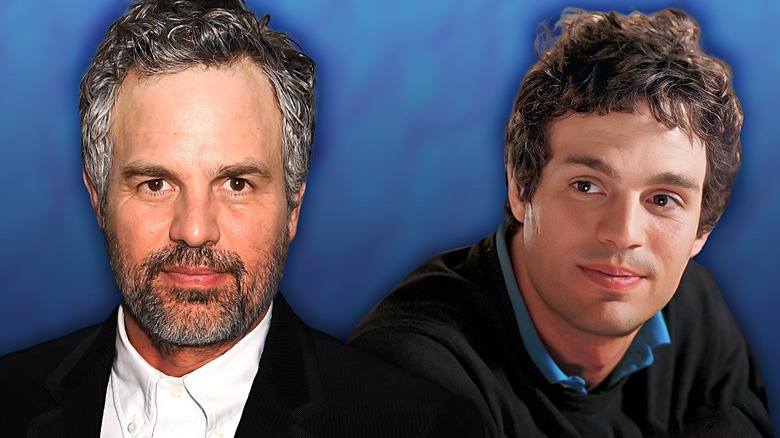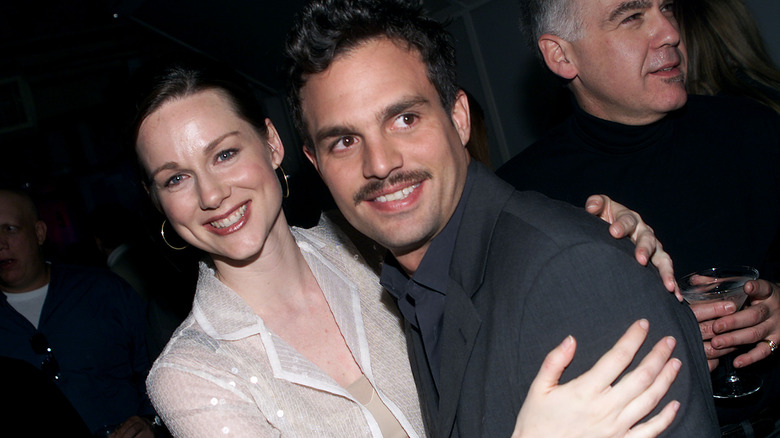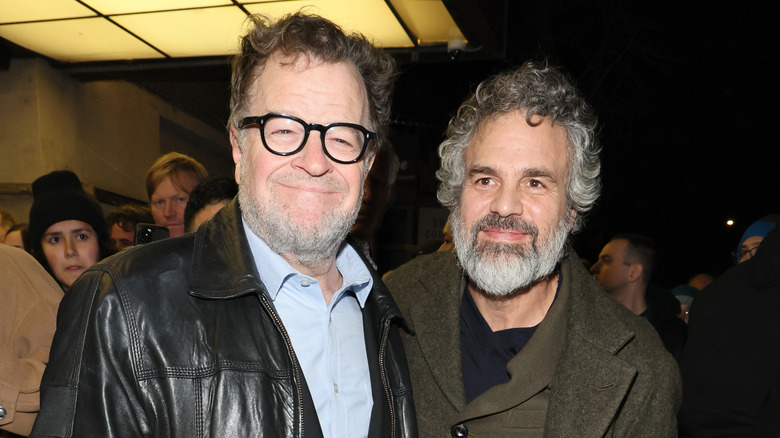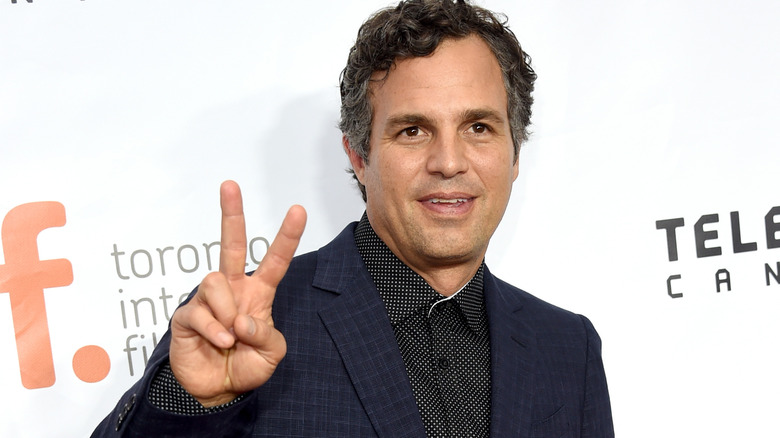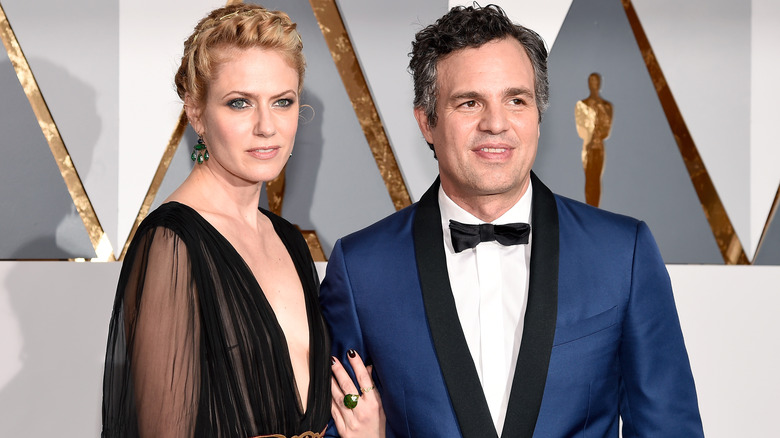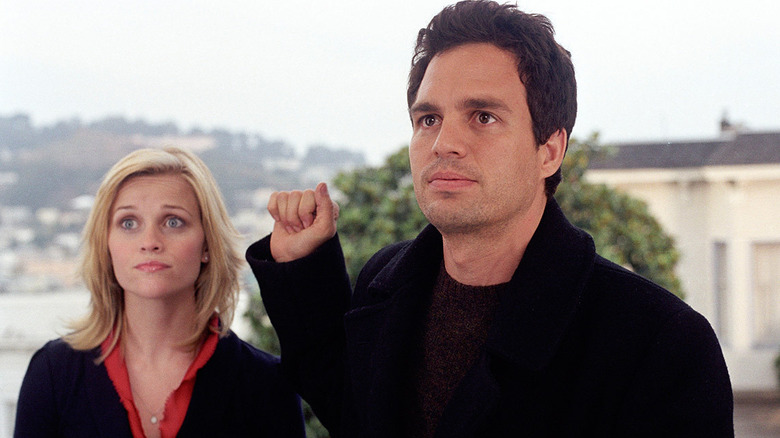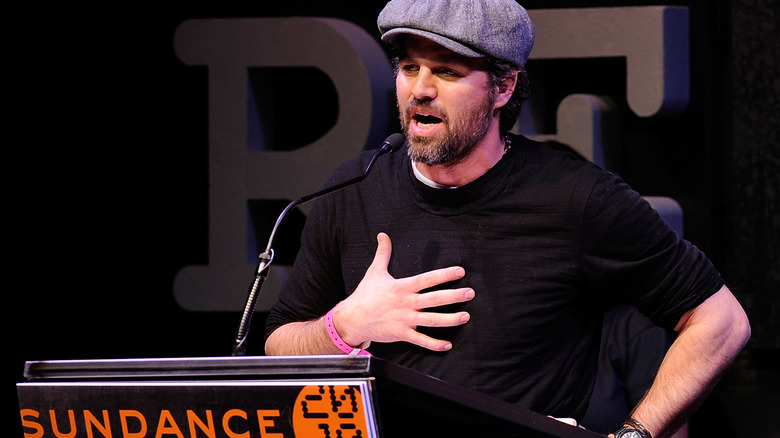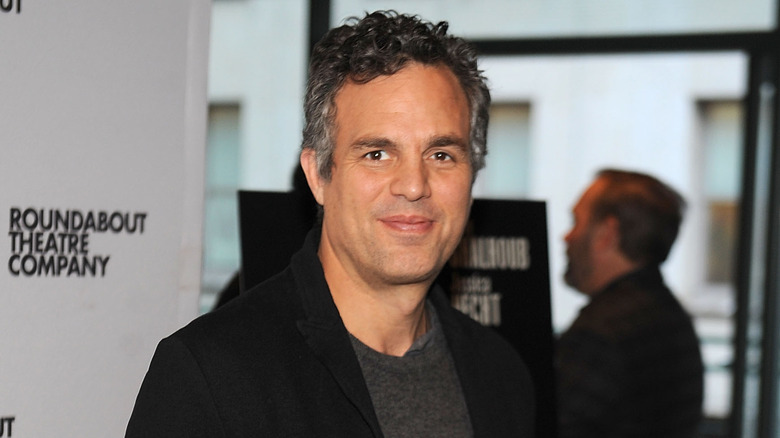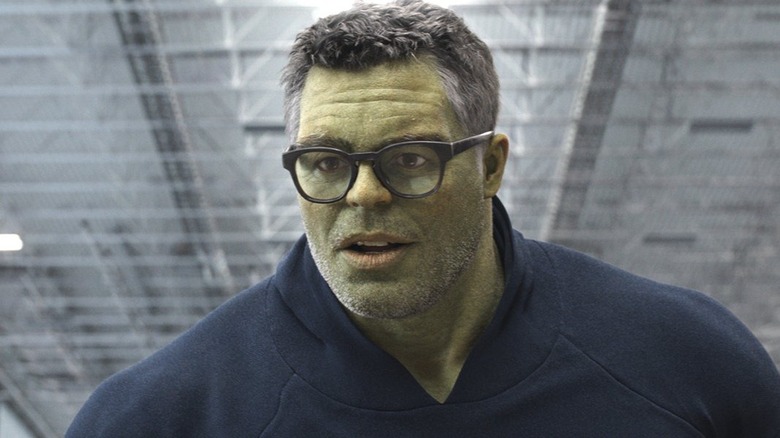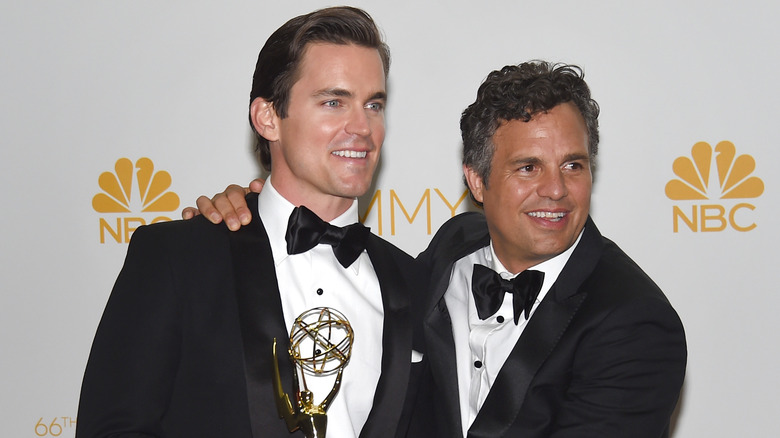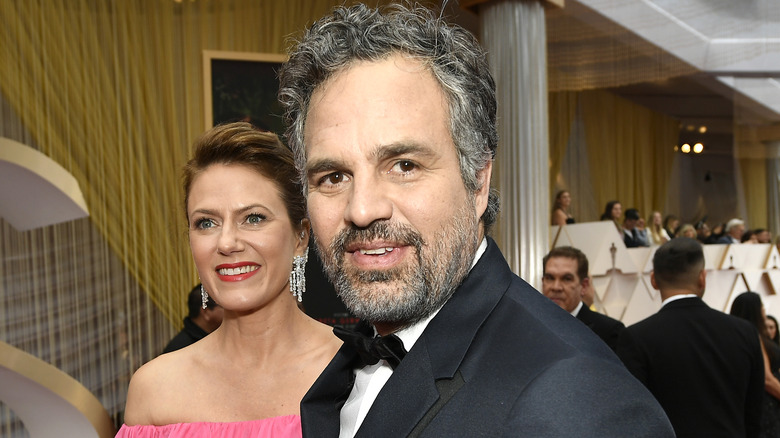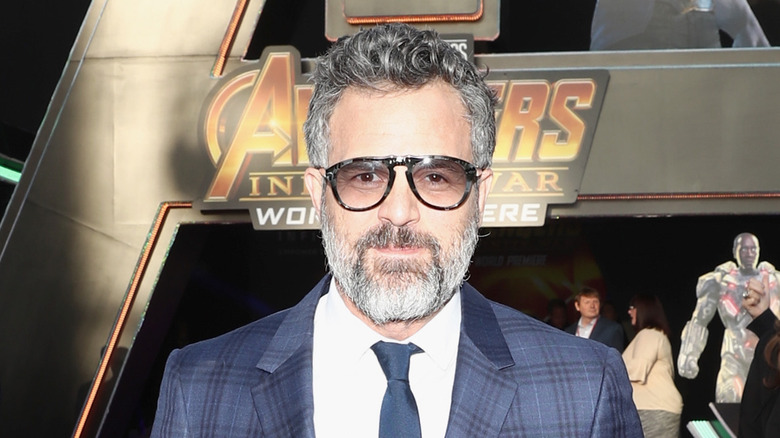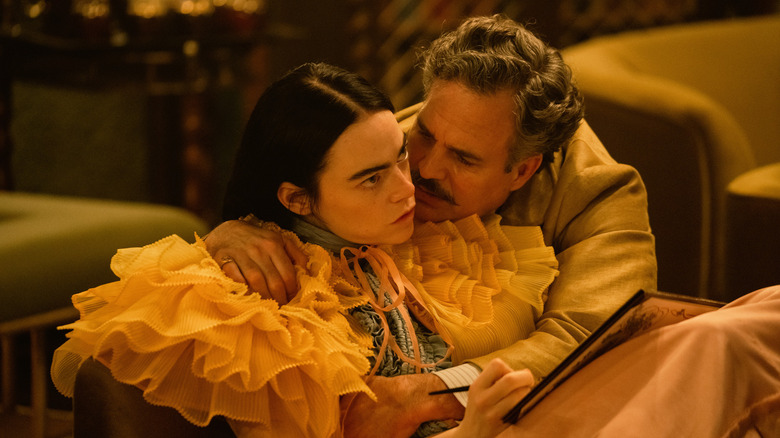Mark Ruffalo Was Never The Same After You Can Count On Me
Mark Ruffalo feels like one of those actors who has always just been around, but he didn't become a household name until 2000. It was in that year that Ruffalo landed his breakthrough role — down on his luck drifter Terry Prescott in the indie drama "You Can Count on Me." Things moved fairly quickly for the Wisconsin native after that, up to and including him landing the role of a certain scientist who turns into a certain green beast in a certain cinematic universe.
Along the way, whether appearing in movies that grossed over a billion dollars at the box office or continuing to strengthen his indie bona fides, Ruffalo has led one of the more varied and interesting careers of any actor in the 21st century. And even though he'd been acting on both the screen and stage for over a decade up to that point, it's clear that "You Can Count on Me" was the moment that everything changed for Mark Ruffalo.
He nearly quit acting before You Can Count on Me
"You Can Count on Me" was far from the actual beginning of Mark Ruffalo's career. His first screen credit actually goes all the way back to 1989, when a 22-year-old Ruffalo appeared in an episode of the anthology series "CBS Summer Playhouse" titled "American Nuclear." For those too young to remember that show, it was actually a collection of pilots that had previously failed to find a home, a way of giving the pilots a second chance. The audience could then call a hotline and vote on the best one from each season, with the presumption that the winning show would then be turned into a series — but none ever were.
So, right from the start, luck didn't seem to be on Ruffalo's side. Going into and throughout the 1990s, things didn't get much better, with the decade bringing a string of bit parts in forgettable movies and more TV projects that never went anywhere. A frustrated Ruffalo took several breaks from acting during that time. He questioned whether continuing to pursue acting as a career was worth it, racking up hundreds of failed auditions. Luckily, he hadn't fully given up by the time the chance to audition for "You Can Count on Me" came along, and that was the launchpad he needed.
Ruffalo had to beg to audition for You Can Count on Me
Mark Ruffalo's acting journey in the '90s included a bit of theater work. More specifically, he was Warren in the original 1996 cast of the play "This Is Our Youth," a role that would be taken over by Michael Cera in the show's Broadway run and would eventually be played by Jake Gyllenhaal, Kieran Culkin, Freddie Prinze Jr., and Casey Affleck in various productions. Variety loved his performance, writing, "One actor in particular Mark Ruffalo is a genuine discovery."
The play put its writer, Kenneth Lonergan, on the map. He went on to pen films like of "Gangs of New York" and "Manchester by the Sea" in the years that followed. But, before that, Lonergan wrote and directed a movie called — wait for it — "You Can Count on Me." Given that he already had history with Ruffalo, you might assume that Lonergan had the actor in mind for the film from the start. Nothing could be further from the truth. In fact, Ruffalo said that he had to literally beg Lonergan to let him audition for the role of Terry Prescott — a role that Ethan Hawke had already been offered. As fate would have it, Hawke turned it down. Lonergan gave Ruffalo a shot, and the rest is history.
You Can Count on Me opened new doors for Ruffalo
"You Can Count on Me" was a huge hit with critics. It has also stood the test of time: It has an impressive 95% rating on Rotten Tomatoes, and four different critics placed it in their personal top 10 films of the the 21st Century during a BBC-organized vote. But what made the movie an especially important one for Mark Ruffalo's career is that it was the first time that most critics had taken notice of his talent, announcing the arrival of the latest great actor who had only just begun to impress.
It didn't take long for the impact to be felt on Ruffalo's career. In fact, it didn't even matter that he had also featured in the dreadful comedy "Committed" that same year — nothing was going to derail the speeding train that "You Can Count on Me" put in motion. Within just a couple of years, Ruffalo went from scrappy indie darling to household name, starring in at least one movie every single year between 2000 and 2019. In fact, some years saw as many as four films with Ruffalo's name on them.
It was his first Oscar-nominated movie
"You Can Count on Me" was an early milestone project for Mark Ruffalo for another key respect — it was nominated for several Academy Awards. Ruffalo himself wasn't nominated, but his co-star Laura Linney was, and Kenneth Lonergan also got a nod for his screenplay. It would end up being the first of many Ruffalo films that made a splash at the Oscars. In the years since, he's been nominated in the best supporting actor category for "The Kids Are All Right," "Foxcatcher," "Spotlight," and "Poor Things."
An Oscar win has eluded Ruffalo thus far, but it's nothing to sneeze at to be a four-time nominee — especially since that ties him with greats like Jack Nicholson, Jeff Bridges, and Al Pacino for the most best supporting actor nominations of all time. And that's to say nothing of how many other major film awards Ruffalo has been nominated for, including BAFTAs, Golden Globes, and Screen Actors Guild awards. He's actually a three-time SAG Award winner, having scooped trophies for "Spotlight" as well as the small screen hits "The Normal Heart" and "I Know This Much Is True."
Indie acclaim turned into mainstream appeal
Though he was making big Hollywood movies alongside smaller films as the 2000s began, Mark Ruffalo tended to take a backseat in the former while getting more attention and acclaim for the latter. It wasn't so much his supporting roles in "Windtalkers" or "View from the Top" that the actor was most closely associated with in the first half of the decade. Rather, it was more indie-minded films like "Eternal Sunshine of the Spotless Mind" and "We Don't Live Here Anymore" — the latter of which also marked his first producer credit.
However, it didn't take long before all that critical heat and his steady rise in recognizability led to Ruffalo playing lead roles in big studio crowd pleasers. It can be argued that the more mainstream movie-going public first took notice of Ruffalo in the 2004 romcom "13 Going on 30," in which he stars opposite Jennifer Garner. The second half of the 2000s and the beginning of the 2010s saw Ruffalo do a lot more big movies, adding the likes of "Just Like Heaven," "Rumor Has It," "Zodiac," "Date Night," "Where the Wild Things Are," and "Shutter Island" to his ever-growing filmography, projects that he likely would have never been involved in had "You Can Count on Me" not put him on that map the way it did.
He reunited with his You Can Count on Me co-star for his directorial debut
A little-known fact about Mark Ruffalo's movie career is that he has twice dabbled in filmmaking. The reason most people aren't aware of his only screenwriting effort — or sole writing credit of any kind — is that it was for a movie that was released before he was famous. Way back in 1996, Ruffalo came up with the story and co-wrote the screenplay for a drama called "The Destiny of Marty Fine." Ruffalo himself plays a fairly small role in the movie, which also stars Catherine Keener, Michael Ironside, and Norman Fell (Mr. Roper on "Three's Company") in one of the actor's final performances.
After its screening at South by Southwest — a screening that was absolutely ravaged by critics — it doesn't seem like "The Destiny of Marty Fine" got a proper theatrical release and eventually went straight to VHS before quickly fading into obscurity. Ruffalo has yet to write another movie, but he did eventually direct one. In 2010, he helmed and starred in "Sympathy for Delicious," which he took as an opportunity to reunite with his "You Can Count on Me" co-star Laura Linney. That one got a better reception in the film festival circuit — even winning a prize at Sundance — but critics were once again not impressed. Still, Ruffalo has said that he's proud of the film and is glad that he at least gave directing a shot.
Ruffalo returned to his stage roots
With Mark Ruffalo so busy establishing himself as a force to be reckoned with on the big screen following his breakout role in "You Can Count on Me," the actor had seemingly left his live theater days behind. However, in 2006, he slowed down a bit so that he could return to the stage, appearing in a Broadway production. That year saw Ruffalo play the role of Moe Axelrod in a Broadway revival of "Awake and Sing!," a show that was first put on way back in 1935. Set in the present day in its initial run, the 2006 version kept the original's Depression-era setting, chronicling the lives of a struggling New York City family.
Ruffalo seemed to effortlessly transition back into a live theater performer for the show, as evidenced by the Tony Award he'd later be nominated for. He didn't win, but the show itself won best revival of a play and best costume design. Returning to the stage is something Ruffalo seems to do every ten years or so, as he did it again in 2017 to co-star with Danny DeVito and Tony Shalhoub for a Broadway production of Arthur Miller's "The Price." Most of the accolades went to DeVito, but Ruffalo also got high praise for his performance. It was a full-circle moment for the actor, whose theater connections helped him land "You Can Count on Me" and launch his movie career.
His fame reached new heights when he joined the MCU
There is a sizable segment of the movie-going population that will likely always associate Mark Ruffalo with a single character. Being part of a superhero team that anchored a multi-billion dollar cinematic universe for the best part of a decade will do that. From the moment Ruffalo took over the role of Marvel's Bruce Banner/Hulk from Edward Norton beginning with 2012's "The Avengers," he jumped to a level of fame that only a small percentage of actors in history can claim to have reached.
Ruffalo has since played the anger-prone scientist in roles of varying size in eight feature films, two Disney+ series, and several shorts. In the most recent incarnations, Bruce Banner and the Hulk are no longer alter egos — they've been combined into one, a still-bulked-up but more intelligent and better-tempered figure known as Professor Hulk. In that form, Ruffalo mostly just voices the character, but the CG model is still very much fashioned after the actor's face.
While the main story arc that started with "The Avengers" was wrapped up with "Avengers: Endgame," Ruffalo has continued to play Hulk in various projects since then. And it seems he has every intention of continuing to reprise the role as long as he's asked to do so — including leading a long-rumored second standalone Marvel Cinematic Universe Hulk movie, if it ever happens. Even if it doesn't, Ruffalo's name will forever be associated with one of the most iconic comic book characters of all time — it's amazing how a little indie film led to him etching his name in pop culture history.
A return to television brought an Emmy win
Back when he was trying to break into the industry, Mark Ruffalo tried his hand at both film and TV. After making his screen debut in an episode of "CBS Summer Playhouse," the actor appeared in a 1994 episode of the comedy series "Due South" and he also starred in two made-for-TV movies. In 2000 — the same year he appeared in "You Can Count on Me" — Ruffalo landed a series regular role on a UPN police procedural series called "The Beat." Never heard of it? That's because it was canceled after only 13 episodes, despite the fact that there was a lot of buzz around the show to begin with.
Once Ruffalo was making movies, he put his small screen days behind him — at least for a little while. In 2013, "Glee" and "American Horror Story" creator Ryan Murphy talked Ruffalo into returning to television for the HBO movie "A Normal Heart." a story about the explosion of the AIDS epidemic in the early 1980s. Ruffalo was initially hesitant to play the role of a gay character, saying that it should be played by a gay actor, but Murphy assured Ruffalo that he was right for the part and Ruffalo signed on. When awards season rolled around, he was probably glad he did — as one of the movie's producers, he took home an Emmy when the show won for outstanding television movie, Ruffalo's first award from a major association.
Ruffalo is an EGOT nominee
The list of people who have earned the coveted EGOT — meaning they've won an Emmy, a Grammy, an Oscar, and a Tony — is a relatively small one, especially when talking about those who didn't have to rely on honorary awards to achieve the milestone. Full disclosure: Mark Ruffalo isn't really all that close to having one himself, and is in fact only a quarter of the way there thanks to his aforementioned Emmy win. And, given that he isn't known to be a serious musician or a stand-up comedian, it might seem like a Grammy will be the thing that makes an eventual EGOT impossible for him. However, Ruffalo has in fact been nominated for a Grammy.
In 2018, the actor got a Grammy nomination for best spoken word album as the reader of the audio version of Bernie Sanders' book "Our Revolution: A Future to Believe In." And, with that, Ruffalo officially became an EGOT nominee, with his Emmy win and the aforementioned Oscar and Tony nominations putting him in this category. He may have been overlooked for "You Can Count on Me," but it seems like he's bound to win an Oscar eventually, and he does always seem to earn raves whenever he does theater, so a Tony win isn't out of the question, either. All he has to do is keep narrating audiobooks for that elusive Grammy and Ruffalo might find himself joining the ranks of EGOT winners someday, which would be an incredible capper to a career kickstarted by a little indie flick from 2000.
His MCU paydays have afforded him more creative freedom
One of the main advantages for an actor like Mark Ruffalo joining the Marvel Cinematic Universe is that it means he gets to earn MCU money. And when someone like Mark Ruffalo gets MCU money, he's not using it to collect sports cars or buy multiple mansions. Instead, he uses that financial security as a buffer that allows him to take on more roles that he truly wants to tackle and that he believes in, regardless of how much they do or don't pay.
With an estimated net worth of $35 million, Ruffalo has seemingly moved beyond the point in his career where he has to take a role just for the payday ever again. And he's made good on that, continuing to take on smaller roles in between big budget superhero movies, romantic comedies, and so on. During his most prolific stint as the Hulk, Ruffalo still found time to add smaller, more character-driven work like "Thanks for Sharing," "Infinitely Polar Bear," and "Dark Waters" to his filmography.
Ruffalo also started doing more television in the 2020s for the first time since "A Normal Heart," not just on Disney+ but also by way of the Netflix drama series "All the Light We Cannot See" and the HBO miniseries "I Know This Much Is True." The latter brought Ruffalo his second Emmy win. He's used to awards shows these days, but, while he didn't get nominated for "You Can Count on Me," he came away with something more valuable — a platform to build on. If he never got that, then he wouldn't be making the kind of money that lets him indulge in passion projects.
Poor Things finally let him break out of his nice guy mold
It's easy to root for Mark Ruffalo in "You Can Count on Me," and the same can be said about the vast majority of his projects: He's built his career on playing nice guys. Ruffalo claims that he never made a point of avoiding villains, it's more that people just didn't see him that way so they never asked him to do it. It's an acting muscle he finally got to stretch fully in 2023's "Poor Things," in which Ruffalo plays the first true bad guy of his career. "I really didn't think I could do it," the actor told Deadline. "Being a bad person on screen, breaking whatever expectations." He went on to add: "Man was it freeing and liberating and just joyfully wicked!"
Between how much he enjoyed playing the twisted lawyer Duncan Wedderburn and all of the raves he got for his performance, will "Poor Things" be looked back upon as the turning point in Ruffalo's career? Has this project opened the floodgates for a period of the actor playing more outright antagonists? Only time will tell, but Ruffalo certainly seemed excited about the prospect when asked. He seems to have found a new lease on his professional life following his involvement in the hit Yorgos Lanthimos film, and none of this would have been possible if he didn't do everything he could to secure the role of Terry Prescott in "You Can Count on Me" all those years ago.
